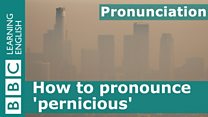Unit 9: English You Need
Exams, news, pronunciation, teachers' tips, learners' questions
Select a unit
- 1 English You Need
- 2 English You Need
- 3 English You Need
- 4 English You Need
- 5 English You Need
- 6 English You Need
- 7 English You Need
- 8 English You Need
- 9 English You Need
- 10 English You Need
- 11 English You Need
- 12 English You Need
- 13 English You Need
- 14 English You Need
- 15 English You Need
- 16 English You Need
- 17 English You Need
- 18 English You Need
- 19 English You Need
- 20 English You Need
- 21 English You Need
- 22 English You Need
- 23 English You Need
- 24 English You Need
- 25 English You Need
- 26 English You Need
- 27 English You Need
- 28 English You Need
- 29 English You Need
- 30 English You Need
Session 4
Welcome to The Teachers’ Room: the show all about teaching practice. In this episode, Dan's at the IATEFL conference picking up some classroom tips from real teachers. Grab a cup of coffee, pull up an armchair and relax. Learn something new, remember something fundamental or just have a giggle.
Activity 1
The Teachers' Room - IATEFL Special
Teachers' Tips from IATEFL
Dan's been meeting teachers at the 2017 International Association of Teachers of English as a Foreign Language (IATEFL) conference in Glasgow, Scotland. Watch the video to find out their top tips for the language classroom...
You can find a copy of the puzzle postcard in Activity 2 on the next page, or download your own copy here. For the answers, go to Activity 3.
Watch the video and complete the activity

___________________________________________________________________
Did you like that? Why not try these?
________________________________________________________________________________
Top tips from the IATEFL conference
Here's what our friends and colleagues at IATEFL said:
Pausing after questions
In any class, but lower level ones in particular, remember to give the students ample time to absorb and understand any questions that you pose to them. They need enough time to hear, understand, think of their answer and then formulate it in English. The worst thing a teacher can do at this point is to interrupt their train of thought by demanding an answer too early.
Bottom up writing for low levels
A great activity to do with lower level learners, less able to make longer narratives. Hand out the end line of a story on a slip of paper, e.g. "and they all lived happily ever after." and 7 more slips. Then ask the students work in groups to write the preceding line, and the next and so on until the story is complete. These stories can then be compared, combined, used to teach about cohesion and conjunctions, etc.
Helping learners understand prepositions of time
Many learners having difficulty remembering the rules of in, on and at, might benefit from a novel perspective. You could teach them that - at represents a single moment in time - at 4 o'clock. Many single moments group together to become a flat surface, or plane. This is on - on Monday. Many planes together become a stack or box comprised of many days - this is in, e.g. in June.
Helping learners to understand past tense
A fun game to play with learners is to have one come out in front of the class and pose as a statue. The next can modify the previous statue and must strike a pose themselves and freeze. The next does the same and so on. After everyone has gone, get the students to sit down. Now you can ask questions about what happened and the class can discuss. Excellent for past tense practice.
Being peer observed
Being observed is an extremely important part of being a teacher. It is crucial to be seen from a different teacher's point of view in order to critically analyse and better understand our teaching methods. There is no such thing as negative feedback. All feedback is useful to be reflected upon and used to contribute towards better teaching practice - which makes a better learner experience.
Puzzle postcard
You can find a copy of the puzzle postcard in Activity 2 on the next page, or download your own copy here. For the answers, go to Activity 3.
To do
Try our quiz to see if you've picked up our tips from IATEFL.
The Teachers' Room IATEFL special Quiz
5 Questions
Check what you've learned by selecting the correct answer to each question.
Help
Activity
Check what you've learned by selecting the correct answer to each question.
Hint
With a bottom up writing, you start at the end of the story and work backwards. What does this force learners to do?Question 1 of 5
Help
Activity
Check what you've learned by selecting the correct answer to each question.
Hint
What do learners need time to do after being asked a question?Question 2 of 5
Help
Activity
Check what you've learned by selecting the correct answer to each question.
Hint
Does everyone think in the same way?Question 3 of 5
Help
Activity
Check what you've learned by selecting the correct answer to each question.
Hint
Moving around is unusual and can be re-energising. How can that affect learning?Question 4 of 5
Help
Activity
Check what you've learned by selecting the correct answer to each question.
Hint
How does a fresh perspective help a teacher to improve?Question 5 of 5
Excellent! Great job! Bad luck! You scored:
Get involved
We'd like to thank all our friends and colleagues at IATEFL for their teaching tips. We know that you teachers out there have lots of fantastic ideas too, and we’d like you to share them with us and everybody else.
If you have a great tip or technique, please email us at learningenglish@bbc.co.uk. Your email could be posted here on this page, or may even be mentioned in our show.
We are also looking for video tips to include in the programme. In order to do this, send one to us, or please include in your email whether or not you’d like to be included for video with your tip, and we'll get in touch with you.
End of Session 4
Next up is Learners' Questions. Yukki from Japan wants to know the difference between actually, in fact and well - and Dan's here with the answer! Join us in Session 5 to find out.
Session Vocabulary
Teachers' tips from IATEFL
- Pausing after questions
- Bottom up writing
- A novel approach to prepositions of time
- Helping learners to understand past tense
- The value of being peer observed


